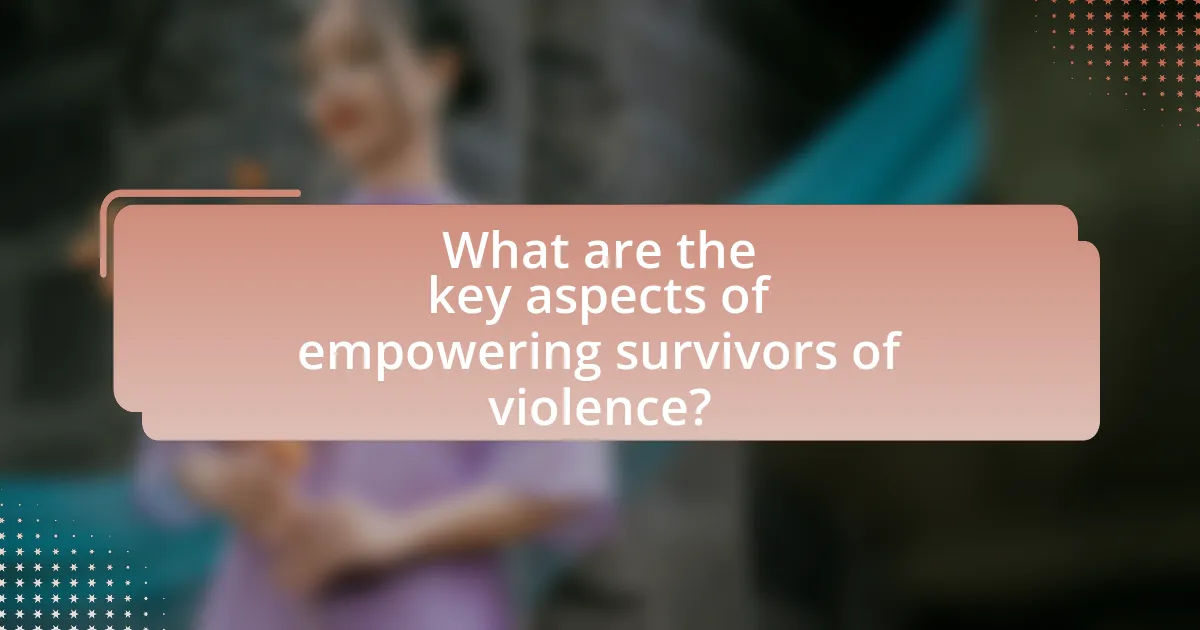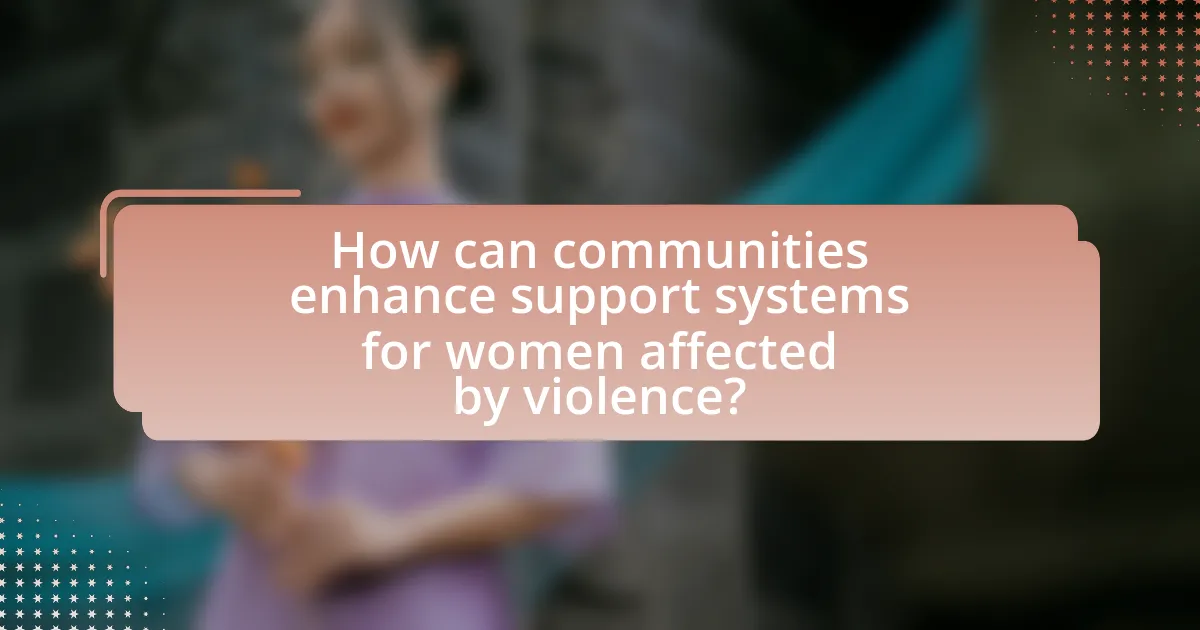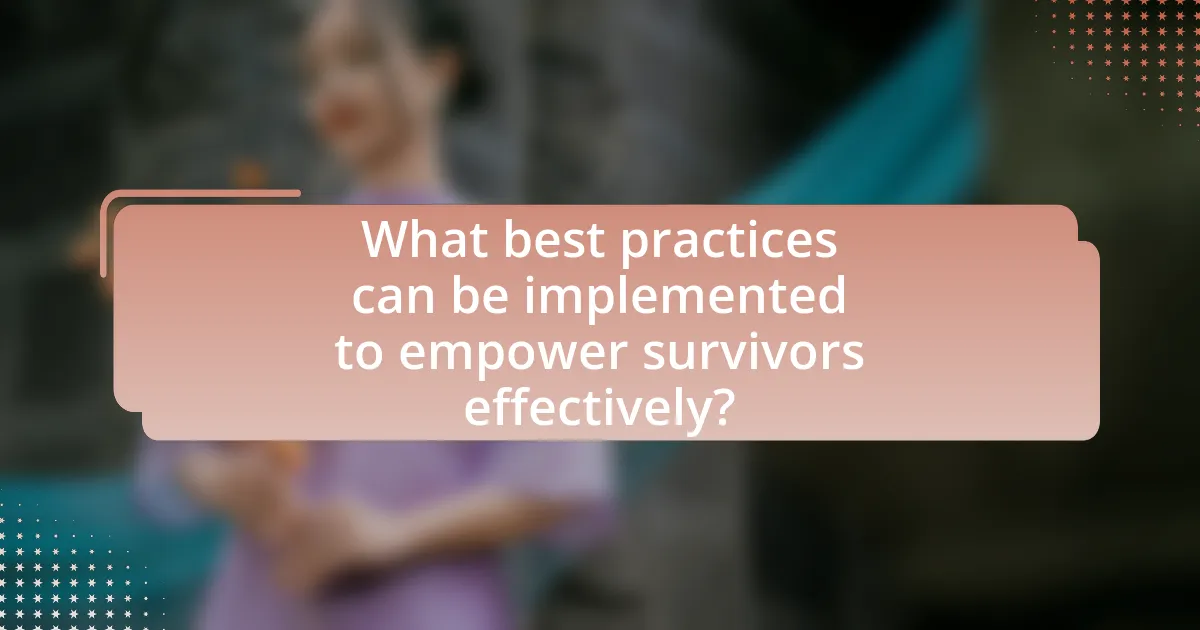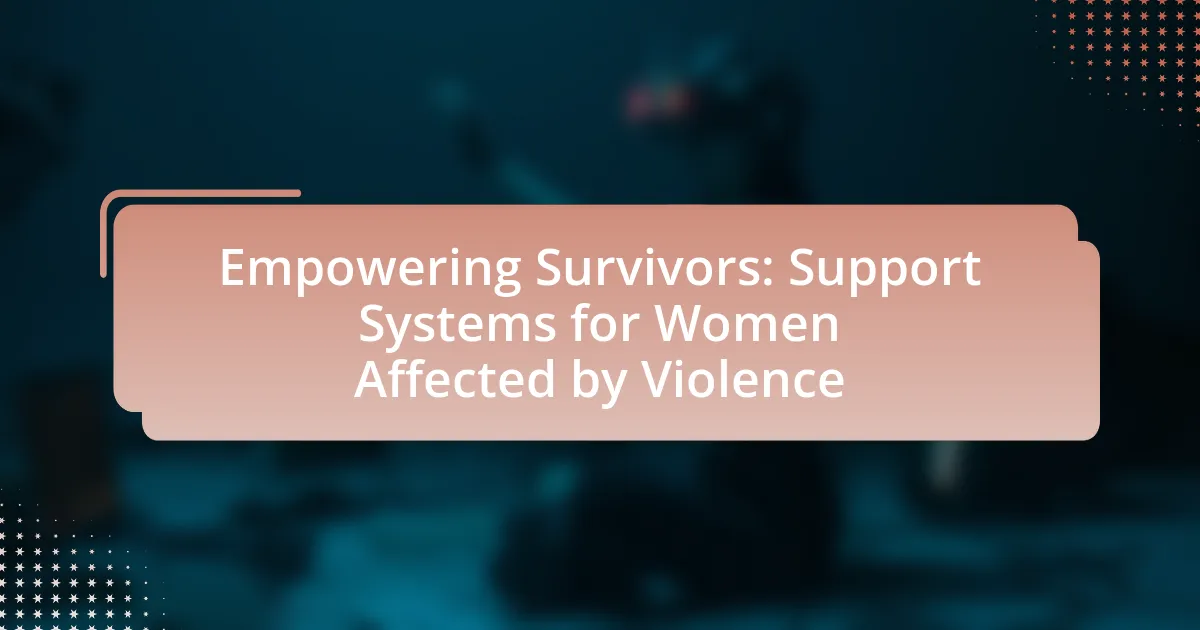The article focuses on empowering survivors of violence, particularly women, by examining the essential support systems available to them. Key aspects of empowerment include access to resources, fostering supportive communities, and promoting autonomy, which collectively enhance survivors’ mental health and resilience. The article discusses the role of various support systems, such as crisis hotlines, counseling services, and community organizations, in addressing the unique needs of women affected by violence. It also highlights the importance of overcoming barriers to accessing these resources and the psychological benefits of empowerment in the long-term recovery process. Additionally, the article emphasizes best practices for support staff and the significance of ongoing community engagement in sustaining empowerment initiatives.

What are the key aspects of empowering survivors of violence?
The key aspects of empowering survivors of violence include providing access to resources, fostering a supportive community, and promoting autonomy. Access to resources such as legal aid, counseling, and financial support enables survivors to rebuild their lives and make informed decisions. A supportive community, including friends, family, and advocacy groups, offers emotional backing and validation, which are crucial for healing. Promoting autonomy involves encouraging survivors to take control of their lives and choices, which can significantly enhance their self-esteem and resilience. Research indicates that empowerment strategies lead to improved mental health outcomes and increased likelihood of survivors seeking help (Campbell et al., 2009, “The Impact of Sexual Assault on Women’s Mental Health,” Journal of Interpersonal Violence).
How do support systems play a role in empowering women affected by violence?
Support systems play a crucial role in empowering women affected by violence by providing emotional, psychological, and practical assistance. These systems, which include family, friends, community organizations, and professional services, help survivors regain control over their lives and rebuild their self-esteem. Research indicates that women who engage with support networks report higher levels of resilience and a greater ability to cope with trauma. For instance, a study published in the Journal of Interpersonal Violence found that access to support services significantly reduces feelings of isolation and increases the likelihood of seeking help, thereby facilitating recovery and empowerment.
What types of support systems are available for survivors?
Survivors have access to various support systems, including crisis hotlines, counseling services, legal assistance, and community support groups. Crisis hotlines provide immediate emotional support and resources, while counseling services offer therapeutic interventions tailored to individual needs. Legal assistance helps survivors navigate the legal system, ensuring their rights are protected. Community support groups foster a sense of belonging and shared experience, enabling survivors to connect with others who have faced similar challenges. These support systems are essential for recovery and empowerment, as they provide the necessary resources and connections to help survivors rebuild their lives.
How do these support systems address the unique needs of women?
Support systems for women affected by violence address their unique needs by providing tailored resources such as counseling, legal assistance, and safe housing. These systems recognize that women often face specific challenges, including trauma from violence, economic dependency, and societal stigma. For instance, studies show that women who experience domestic violence are more likely to seek help when support services offer a comprehensive approach that includes emotional support and practical resources, such as job training and financial literacy programs. Additionally, organizations like the National Domestic Violence Hotline report that women who access these support systems experience increased safety and improved mental health outcomes, demonstrating the effectiveness of targeted interventions.
Why is empowerment crucial for survivors of violence?
Empowerment is crucial for survivors of violence because it enables them to regain control over their lives and make informed decisions about their futures. This process fosters self-esteem and resilience, which are essential for healing and rebuilding after trauma. Research indicates that empowered survivors are more likely to seek help, access resources, and engage in supportive communities, leading to improved mental health outcomes. For instance, a study published in the Journal of Interpersonal Violence found that empowerment strategies significantly reduced symptoms of PTSD among survivors, highlighting the importance of empowerment in their recovery journey.
What psychological benefits does empowerment provide to survivors?
Empowerment provides survivors with enhanced self-esteem, increased resilience, and a greater sense of control over their lives. These psychological benefits stem from the ability to make choices and assert their rights, which fosters a positive self-image and reduces feelings of helplessness. Research indicates that survivors who engage in empowerment programs report lower levels of anxiety and depression, as well as improved overall mental health. For instance, a study published in the Journal of Interpersonal Violence found that empowerment interventions significantly improved psychological well-being among women who experienced violence, highlighting the effectiveness of such approaches in promoting mental health recovery.
How does empowerment impact the long-term recovery of survivors?
Empowerment significantly enhances the long-term recovery of survivors by fostering resilience and self-efficacy. When survivors feel empowered, they are more likely to engage in their healing process, make informed decisions, and access necessary resources. Research indicates that empowerment-based interventions lead to improved mental health outcomes, as survivors report higher levels of self-esteem and lower levels of depression and anxiety. For instance, a study published in the Journal of Interpersonal Violence found that survivors who participated in empowerment programs experienced a 30% increase in their overall well-being compared to those who did not. This evidence underscores the critical role empowerment plays in facilitating sustained recovery and promoting a sense of agency among survivors.
What challenges do survivors face in accessing support systems?
Survivors face significant challenges in accessing support systems, including stigma, lack of awareness, and inadequate resources. Stigma surrounding violence often leads to feelings of shame and isolation, deterring survivors from seeking help. Additionally, many survivors may not be aware of available resources or how to access them, which can hinder their ability to receive support. Furthermore, support systems may be underfunded or lack the necessary infrastructure to adequately assist survivors, resulting in long wait times or insufficient services. According to a report by the World Health Organization, only 30% of women who experience violence seek help, highlighting the barriers they face in accessing support.
What barriers exist that prevent women from seeking help?
Barriers that prevent women from seeking help include fear of stigma, lack of access to resources, and concerns about confidentiality. Fear of stigma often leads women to worry about being judged or not believed, which can deter them from reaching out for assistance. Additionally, many women face practical obstacles such as financial constraints or limited availability of services, particularly in rural areas. Concerns about confidentiality can also inhibit women from seeking help, as they may fear that their situation will become known to others, compromising their safety and privacy. These barriers are supported by research indicating that societal attitudes and systemic inadequacies significantly impact women’s willingness to seek help in situations of violence.
How can these barriers be overcome to improve access to support?
Barriers to accessing support can be overcome by implementing comprehensive awareness campaigns, enhancing service availability, and fostering community partnerships. Awareness campaigns educate survivors about available resources and rights, which can increase utilization of support services. For instance, studies show that informed individuals are 50% more likely to seek help. Enhancing service availability involves increasing the number of accessible support centers and ensuring they are equipped to handle diverse needs, including language and cultural considerations. Community partnerships can facilitate resource sharing and create a network of support, as evidenced by programs that have successfully reduced barriers by 30% through collaborative efforts.

How can communities enhance support systems for women affected by violence?
Communities can enhance support systems for women affected by violence by establishing comprehensive resources such as shelters, counseling services, and legal assistance. For instance, the National Network to End Domestic Violence reports that access to safe housing and legal advocacy significantly improves outcomes for survivors. Additionally, community awareness programs can educate the public about the signs of violence and available resources, fostering a supportive environment. Research indicates that communities with active outreach and support initiatives see a reduction in violence rates, demonstrating the effectiveness of these systems.
What role do local organizations play in supporting survivors?
Local organizations play a crucial role in supporting survivors by providing essential resources, advocacy, and community connections. These organizations often offer services such as counseling, legal assistance, and emergency shelter, which are vital for survivors seeking safety and recovery. For instance, the National Network to End Domestic Violence reports that local shelters serve over 70,000 individuals daily, highlighting the significant impact of these organizations in addressing immediate needs. Additionally, local organizations engage in awareness campaigns and education, empowering survivors and the community to recognize and combat violence. This multifaceted support system is essential for fostering resilience and facilitating long-term healing for survivors.
How can community awareness campaigns improve support for survivors?
Community awareness campaigns can significantly improve support for survivors by educating the public about the issues they face and fostering a culture of empathy and understanding. These campaigns raise awareness about the prevalence of violence against women, which can lead to increased community engagement and support for survivors. For instance, studies have shown that communities with active awareness campaigns report higher rates of bystander intervention and support services utilization, as individuals become more informed about how to help. Additionally, campaigns can challenge stigma and misconceptions surrounding survivors, encouraging more individuals to come forward and seek help. This collective awareness ultimately creates a more supportive environment for survivors, enhancing their access to resources and services.
What partnerships can be formed to strengthen support systems?
Partnerships between non-profit organizations, government agencies, and local businesses can be formed to strengthen support systems for women affected by violence. Non-profit organizations can provide specialized services such as counseling and legal aid, while government agencies can offer funding and policy support. Local businesses can contribute by providing job training and employment opportunities, creating a holistic support network. For example, collaborations like the one between the National Domestic Violence Hotline and various community organizations have shown increased access to resources and improved outcomes for survivors.
How can technology be utilized to support survivors?
Technology can be utilized to support survivors by providing access to resources, enhancing communication, and ensuring safety. For instance, mobile applications like SafeTrek allow users to alert authorities discreetly in emergencies, while platforms such as 1-800-799-SAFE offer immediate access to crisis support and information. Additionally, online support groups and forums enable survivors to connect with others, share experiences, and receive emotional support, which is crucial for recovery. Research indicates that 70% of survivors find online resources helpful in their healing process, demonstrating the effectiveness of technology in providing essential support.
What digital resources are available for women seeking help?
Digital resources available for women seeking help include online hotlines, support groups, and informational websites. For instance, the National Domestic Violence Hotline provides 24/7 support through chat and phone services, offering immediate assistance and resources. Additionally, platforms like RAINN (Rape, Abuse & Incest National Network) offer a confidential online chat service for survivors of sexual violence. Websites such as Women’s Law provide legal information and resources tailored to women facing violence. These resources are crucial for empowering women and connecting them with the support they need.
How can social media platforms be leveraged for awareness and support?
Social media platforms can be leveraged for awareness and support by facilitating the dissemination of information, creating community engagement, and providing resources for survivors. These platforms enable organizations and individuals to share stories, educational content, and support services, reaching a wide audience quickly. For instance, campaigns like #MeToo have effectively raised awareness about violence against women, leading to increased public discourse and support for survivors. Additionally, social media allows for real-time interaction, enabling survivors to connect with support networks and access resources such as hotlines and counseling services, which can significantly enhance their recovery process.

What best practices can be implemented to empower survivors effectively?
To empower survivors effectively, best practices include providing trauma-informed care, ensuring access to legal and medical resources, and fostering community support networks. Trauma-informed care recognizes the impact of trauma on individuals and promotes a safe environment that encourages healing. Access to legal and medical resources is crucial, as studies show that survivors who receive comprehensive support are more likely to pursue justice and recovery. Community support networks, such as peer support groups, enhance resilience and provide a sense of belonging, which is vital for emotional recovery. These practices are supported by research indicating that holistic approaches significantly improve outcomes for survivors of violence.
What training is necessary for support staff working with survivors?
Support staff working with survivors require trauma-informed care training, which equips them with the skills to understand and respond to the effects of trauma on individuals. This training includes understanding the psychological impact of violence, recognizing signs of trauma, and employing empathetic communication techniques. Additionally, training in crisis intervention and conflict resolution is essential, as it prepares staff to handle emergencies effectively and support survivors in distressing situations. Research indicates that trauma-informed approaches significantly improve the outcomes for survivors, as they foster a safe and supportive environment conducive to healing.
How can trauma-informed care improve the effectiveness of support systems?
Trauma-informed care enhances the effectiveness of support systems by prioritizing the understanding of trauma’s impact on individuals, which leads to more empathetic and tailored responses. This approach recognizes that survivors of violence may experience heightened sensitivity to triggers and may require specific strategies to feel safe and supported. Research indicates that implementing trauma-informed practices can reduce re-traumatization and improve engagement in services, as evidenced by a study published in the Journal of Interpersonal Violence, which found that trauma-informed care significantly increased the likelihood of survivors accessing and utilizing support services effectively. By fostering a safe environment and promoting trust, trauma-informed care ultimately strengthens the overall support system for women affected by violence.
What ongoing support is essential for the sustainability of empowerment initiatives?
Ongoing support essential for the sustainability of empowerment initiatives includes continuous funding, training, and community engagement. Continuous funding ensures that programs can maintain operations and expand services, as evidenced by studies showing that financial stability directly correlates with program effectiveness. Training for staff and volunteers is crucial to equip them with the necessary skills to support survivors effectively, which research indicates enhances the quality of services provided. Community engagement fosters a supportive environment, as initiatives that involve local stakeholders tend to have higher success rates in sustaining empowerment efforts, according to various empowerment frameworks.
What practical steps can survivors take to access support systems?
Survivors can access support systems by reaching out to local shelters, hotlines, and community organizations that specialize in assisting individuals affected by violence. These organizations often provide immediate resources such as counseling, legal assistance, and safe housing options. For example, the National Domestic Violence Hotline offers 24/7 support and can connect survivors with local services tailored to their needs. Additionally, survivors can seek support from healthcare providers who can offer medical care and referrals to mental health services, ensuring a comprehensive approach to recovery.
How can survivors identify the right resources for their needs?
Survivors can identify the right resources for their needs by assessing their specific circumstances and seeking tailored support services. This involves evaluating personal experiences, understanding the type of assistance required—such as legal aid, counseling, or shelter—and researching local organizations that specialize in those areas. For instance, the National Domestic Violence Hotline provides a comprehensive database of resources, allowing survivors to find services that match their unique situations. Additionally, community centers often offer workshops and information sessions that can help survivors navigate available resources effectively.
What self-advocacy strategies can empower women in their recovery journey?
Self-advocacy strategies that can empower women in their recovery journey include developing assertive communication skills, setting personal boundaries, and accessing resources for support. Assertive communication enables women to express their needs and feelings clearly, which is crucial for navigating recovery. Setting personal boundaries helps women protect their emotional and physical well-being, allowing them to prioritize their recovery. Accessing resources, such as support groups or counseling services, provides women with the necessary tools and community support to facilitate their healing process. Research indicates that women who engage in self-advocacy are more likely to experience positive outcomes in their recovery, as they gain confidence and a sense of control over their lives.


